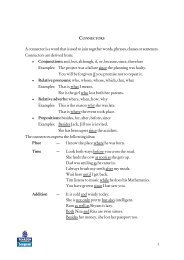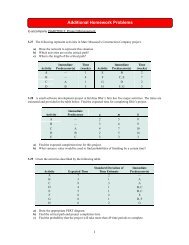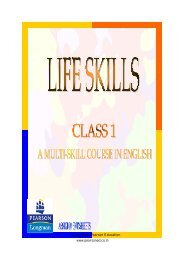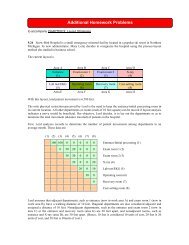We use words to express our thoughts. How well we ... - Pearson
We use words to express our thoughts. How well we ... - Pearson
We use words to express our thoughts. How well we ... - Pearson
You also want an ePaper? Increase the reach of your titles
YUMPU automatically turns print PDFs into web optimized ePapers that Google loves.
SENTENCE<br />
<strong>We</strong> <strong>use</strong> <strong>words</strong> <strong>to</strong> <strong>express</strong> <strong>our</strong> <strong>thoughts</strong>. <strong>How</strong> <strong><strong>we</strong>ll</strong> <strong>we</strong> <strong>express</strong> these <strong>thoughts</strong> will<br />
depend on the <strong>words</strong> <strong>we</strong> <strong>use</strong> and the way <strong>we</strong> arrange these <strong>words</strong>.<br />
A group of <strong>words</strong> that are arranged in such an order that they make complete sense<br />
is called a sentence.<br />
<br />
A sentence always:<br />
• begins with a capital letter<br />
• ends with a full s<strong>to</strong>p, or a question mark or an exclamation mark<br />
• contains a verb.<br />
There are f<strong>our</strong> kinds of sentences:<br />
• Assertive sentences or statements are sentences which tell us something, that<br />
is, state a fact and end with a full s<strong>to</strong>p.<br />
Examples: Runa has invited us <strong>to</strong> her birthday party.<br />
Raja has a long way <strong>to</strong> drive.<br />
I have eaten some fruit.<br />
• Interrogative sentences or questions are sentences which ask a question and<br />
end with a question mark.<br />
Examples: What is y<strong>our</strong> name?<br />
Has the road been repaired?<br />
Have you visited the doc<strong>to</strong>r?<br />
• Imperative sentences are sentences which command, order or request someone<br />
<strong>to</strong> do something and end with a full s<strong>to</strong>p.<br />
Examples: Please sign y<strong>our</strong> name on the dotted line.<br />
S<strong>to</strong>p that noise.<br />
This assignment must be completed.<br />
• Exclama<strong>to</strong>ry sentences are sentences which <strong>express</strong> strong feelings and end<br />
with an exclamation mark.<br />
Examples: Thank God you are safe!<br />
What a delicious meal that was!<br />
1
Depending upon the cla<strong>use</strong>s present in them, sentences can be further classified in<strong>to</strong><br />
simple, compound and complex sentences.<br />
• Simple sentence: A simple sentence contains only one finite verb.<br />
Examples: I have <strong>to</strong> learn dancing.<br />
Here ‘learn’ is the finite verb.<br />
He <strong>we</strong>nt <strong>to</strong> his office.<br />
They put their plates down.<br />
• Compound sentence: A compound sentence has two or more principal cla<strong>use</strong>s.<br />
Examples: She wants <strong>to</strong> go <strong>to</strong> the circus but her parents want her <strong>to</strong> go<br />
<strong>to</strong> school.<br />
Here both the underlined parts are independent/principal cla<strong>use</strong>s.<br />
I would have attended the meeting if they had given me a call.<br />
Shelley was asked <strong>to</strong> close the windows but she did not do so.<br />
• Complex sentence: A complex sentence has an independent cla<strong>use</strong> and one or<br />
more dependent cla<strong>use</strong>s.<br />
Examples: The principal felt that I should take rest.<br />
Here the first underlined part is the dependent cla<strong>use</strong> and the<br />
second is the principal cla<strong>use</strong>.<br />
My mother said that I should study properly.<br />
I am <strong>we</strong>aring the dress that she gifted me.<br />
2
WORKSHEET 20<br />
I. Identify the sentences as assertive (A), interrogative (Q), imperative (I),<br />
exclama<strong>to</strong>ry (E).<br />
a) Have the children returned from school?<br />
b) <strong>How</strong> clever I am!<br />
c) The temple will be built on the beach.<br />
d) Please give me a glass of water.<br />
e) Canada is a rich country.<br />
f) Who is the department in-charge?<br />
g) Get out.<br />
h) Alas! He is no more.<br />
II. Change the following questions as directed in the brackets.<br />
a) Oh! What a severe headache I have! (assertive)<br />
b) I do not know the ans<strong>we</strong>r. (interrogative)<br />
c) What an exciting adventure <strong>we</strong> had! (assertive)<br />
d) I can hear you. (interrogative)<br />
e) Is Goa a beautiful state? (assertive)<br />
f) The train leaves at five o’clock. (interrogative)<br />
g) Will mother attend the meeting? (assertive)<br />
h) Have the children returned from school? (assertive)<br />
i) Was Vikramaditya a just king? (assertive)<br />
j) What a lazy boy you are! (assertive)<br />
III. Identify the sentences as simple, compound, complex.<br />
a) Canada is a rich country, but still it has many poor people.<br />
b) Although my friend invited me <strong>to</strong> a party, I do not want <strong>to</strong> go.<br />
c) My friend invited me <strong>to</strong> a party, but I do not want <strong>to</strong> go.<br />
d) Mr Seth, a teacher at Sri Ram School, enjoys teaching.<br />
e) The man who is <strong>we</strong>aring a black shirt is my brother.<br />
f) Ratul and Ravi had a big fight <strong>to</strong>day.<br />
g) <strong>We</strong> had <strong>to</strong> go inside when it started raining.<br />
h) Jairam hid the hen, and Beena tried <strong>to</strong> hide the cow.<br />
3


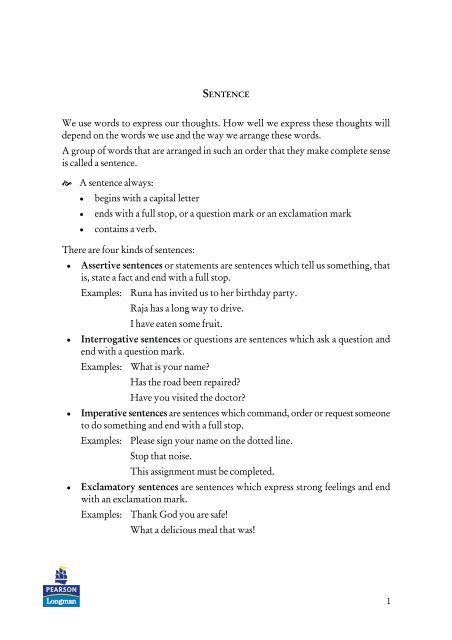
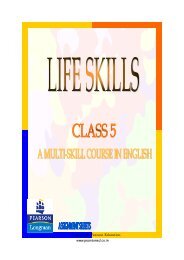
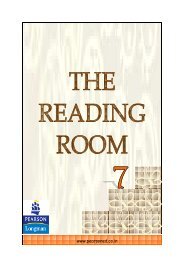
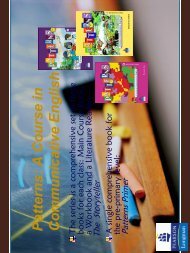
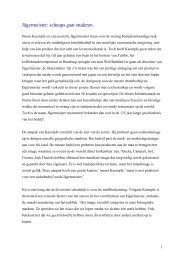
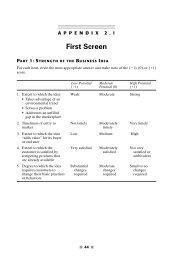
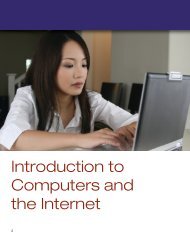



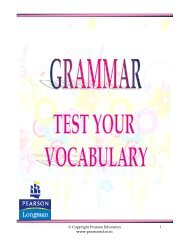
![[Productnaam] Marketingplan - Pearson](https://img.yumpu.com/26285712/1/190x132/productnaam-marketingplan-pearson.jpg?quality=85)
